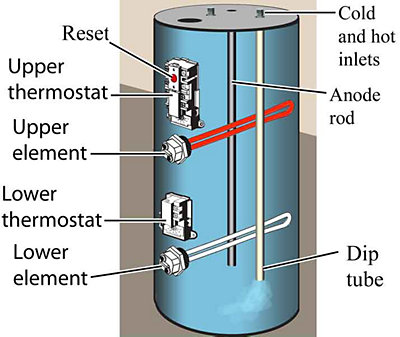Water Heaters
Prepare Your Plumbing Plan for Winter this Fall
October 15th, 2018
Football’s on TV, leaves are falling from the trees, the weather is crisper, days shorter. What should you do when it’s halftime? We say, be productive (during at least one of the games) and get your plumbing plan ready for winter. The average person can complete the following fall plumbing fundamentals in the time it takes your team to get back on the field. And you would score some points with your significant other for not failing to plan. Because if you fail to plan, your pipes might fail you this winter. Turn off your outdoor sprinkler system and drain the lines. The mess and cost to replace burst sprinkler lines is outrageous. Please take the time to turn off your system and drain. Otherwise, you might be in for a nasty surprise of burst pipes, leaking water, and a ruined lawn. Insulate your exposed pipes. We’re not in Alaska, but it gets cold enough here for your exposed pipes to burst at just the wrong time. Take a little time and do it now. Seriously. Schedule an inspection of your water heater unless you like cold showers in the dead of winter. Imagine: It’s December 24. It’s cold outside [...]
Can You Use Plumbing While The Power’s Out?
August 13th, 2018
Have you ever wondered if it’s safe to use the toilet or shower in your home while the power is out? You may have access to water through your plumbing line, but you should be cautious. Follow these tips to know how you should use your plumbing system during a power outage. Water Heater Water heaters, even those that burn fuel like natural gas, need electricity to run. Fuel-based water heaters use electricity to start the heating process. No power means no hot water. If you have heated water in a tank, it may stay warm for a little while after the power goes out. But sometimes, hot water is an absolute necessity. In those cases, you might consider getting a generator to run your water heater. Faucets and Sinks Even without hot water, you may notice that your faucets still run fairly normally during a power outage. Homes that are connected to the local water supply should still have access to cold water. People who use an electric pump to draw water out of a well may temporarily lose access to water. If the power outage relates to flooding, you may be concerned about water contamination. Follow the [...]
5 Signs Your Vintage Home Needs New Plumbing
May 30th, 2018
Having a well-maintained older home is something to be proud of. Knowing that the plumbing is still in great shape is icing on the cake. How do you know, though? There are a few ways to spot aging plumbing, and you don’t have to be an expert to see them. If you notice any of these, it’s time to make a call. Rusty Water Ruins Your Day Your pipes can actually give you hints that the plumbing is damaged or on its last legs. Rusty water could be one of the first. No matter what kind of material you have for your plumbing, unless you use a well, the water should come through clean and clear. While this may also be caused by a buildup of sediment your water heater or older galvanized waterlines, water that is brown, grey or otherwise discolored may contain flakes of the pipes that are coming off. This level of corrosion shows you that the pipes are seriously wearing out. Water Pressure Is Down to a Trickle You turn on the faucet, but water only trickles through. While you may be able to deal with this problem for a little while, weak water pressure throughout [...]
Plumbing Issues that Require a Professional Touch
May 17th, 2018
Every homeowner knows and understands that plumbing problems are both annoying and frustrating. Sometimes you can handle the problem yourself with a plunger or a quick trip to the hardware store. When you have a problem that lingers on or gets progressively more severe, you need to enlist the services of a professional. Here is a look at some of those plumbing issues that necessitate the help of a plumber. #1. Pipe Leaks Sometimes the indications of a pipe leak are apparent. You open the cabinet under a sink and find a puddle of accumulated water there, or you touch a pipe, and it feels wet. Another possible indication that you have a pipe leak is a significant increase in your water bill--especially if there is no change in the way the people in your house are using water. You might be able to stop the leak temporarily with a joint or pipe compounding product that you can buy at a home improvement or hardware store, but this fix is temporary. Whether the cause of the leaking pipe is due to corrosion or general wear or tear, trust that the Mr. Plumber professionals will take care of you and your leaking pipes [...]
Four Scary Noises Your Water Heater is Making and What They Might Mean
February 7th, 2018
The water heater may be the most overworked and under-appreciated piece of mechanical equipment in a house. We usually assume it's doing its job as it should and leave it alone, unless it starts to make weird and scary noises. To help you avoid a potentially dangerous and expensive plumbing crisis, we're looking at four frightening sounds your water heater can make and what they mean. Popping Sounds One of the most common sounds a water heater can make is popping. When that happens, it's usually an indication that your water heater has an excess of mineral deposits and sediment at the bottom. This is especially problematic in areas that have hard water. Mineral deposits (mainly lime and calcium), sand, and any debris that might travel through the water supply can stick to the bottom of your water heater. Eventually, the buildup of gunk at the bottom may trap water beneath the sediment. Think of a pot of water you have on the stove. If you're not paying attention, and if the heat is too high, the water will boil, and it will continue to boil until it flows over the sides of the pot. In the case of your [...]
No Hot Water? Maybe It’s Time for a New Water Heater
September 21st, 2017
You’re in the shower preparing for that long Monday ahead of you. You’re soaped up from head to toe, enjoying the warm shower before you face the day, until …that first drop of cold water hits your back. There’s no going back now. The threat of cold showers has been lurking around for a while now, and now you’re out in the cold. After suffering through the rest of your shiver-inducing shower, you run to the basement and check your water heater, and, yep, you guessed it…it’s not working anymore. Maybe it’s finally time to replace that old unit. Your water heater is one of the most-used but rarely-seen appliances. The only time you pay attention to the water heater is when it stops working. Then you realize just how important it really is. If your current water heater is more than 10 years old, you could be in the market for a new one soon. Next to your heating and air conditioning system, your water heater is one of the biggest energy users in your home. With homes becoming more energy efficient, it’s important to consider efficiency when selecting a new water heater. But the lifespan, cost and capacity are important, [...]
Beware This Gross Sign Your Water Heater Won’t Make it Through Winter
September 21st, 2016
If you’ve noticed reddish-brown water coming from your faucets, you’re probably wondering what’s causing it. Reddish-brown water is usually caused by a high amount of rust in your water. And, unfortunately, rust in your hot water is a tell-tale sign that your hot water heater is dying.
Why is My Water Heater Tripping the Reset Button?
June 7th, 2016
Your water heater reset button is a safety device that shuts off power to your water heater when the water temperature inside it exceeds 180 degrees Fahrenheit. So, what’s causing the button to keep tripping? There are a number of possible underlying problems.
The Nasty Reason You Should Be Flushing Your Water Heater Annually
April 18th, 2016
Did you know that sediment and sludge collect and hide at the bottom of your water heater tank? water has lots of dissolved minerals in it that are perfectly safe for you to drink. But they can settle at the bottom of your water heater and create a nasty sludge. And this sludge is more than just nasty. It also causes some inconvenient and expensive problems for you.
3 Ways NOT to Unclog Your Toilet (Unless You Want to Damage It)
January 28th, 2016
You go. You flush. The water starts rushing in to clear the toilet. But the water just keeps rising. The toilet is clogged! In a panic to take care of the clog, many people make costly mistakes unclogging their toilet. We don’t want that to be you!










